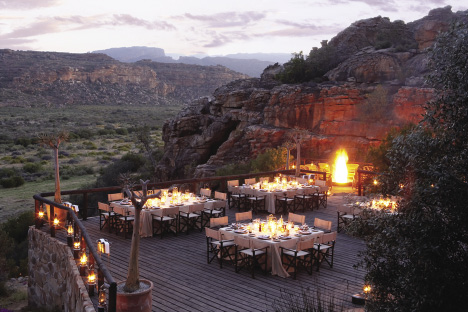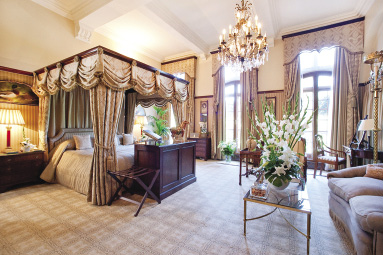


![]()
ONLINE

“Welcome Home”
Editors’ Note
Terry Holmes began his career in the kitchen of The Dorchester Hotel on Park Lane where he spent seven years. He then worked in The Terrace Room Restaurant where he went from being a Commis Waiter to Chef de Rang to Chef de Brigade. From there, he went on to work in their exclusive wine cellars. He then worked in the accounts office, the billing office, and the food stores and was later in the control office dealing with the bookkeeping. After this, he moved into reception. Holmes was soon hired as an Assistant Manager for The Stafford Hotel. He was subsequently promoted to General Manager at The Stafford in 1974 and in 1977 became the youngest ever Managing Director of a West End hotel. In 1985, The Stafford was sold to Trafalgar House and he was appointed a director of Cunard Hotels U.K. That same year, he went to the U.S. to start up Cunard’s U.S. hotels division as Vice President-Cunard Hotels and Resorts Western Hemisphere. In 1988, Holmes returned to London as Vice President and Managing Director of Cunard Hotels U.K. which comprised The Ritz London, The Stafford, and Dukes Hotel. In 1995, The Stafford was sold to Daniel Thwaites and Holmes joined the new owners as Executive Director of The Stafford. During his stint at The Stafford, Holmes also became Advisor to the British Army and was seconded to the Royal Logistic Corps, which brings with it the honorary rank of Major General. In 2006, Holmes joined Red Carnation Hotels as Executive Director.
Company Brief
In 1984, starting with purchase of London-based The Chesterfield Hotel, Bea Tollman decided to create Red Carnation Hotels (www.redcarnationhotels.com; RCH). RCH has since evolved into what is now an award-winning, family owned and run collection of 14 five- and four-star boutique luxury hotels, along with a gastropub and a South African-inspired London restaurant. From Africa and the U.S. to Europe, RCH has established a reputation for timeless decor, exceptional locations, highly personal and genuine guest care, and celebrated cuisine.
How strong has business been for Red Carnation?
With all that has happened in London in 2012, it has been better than people thought it would be. We had a good Olympics – the hotels were very busy. Unlike a lot of others, we didn’t raise our prices.
We had a good Jubilee; we’re in the heart of London, which makes us easy to get to. The Jubilee and the Olympics created quite a stir on television and we’re seeing that effect follow through even now.
So while some other properties didn’t do well, our London properties generally had a good year in 2012.

Bushmans Kloof Wilderness Reserve and
Wellness Retreat in the Cederberg Mountains
of South Africa
What makes a Red Carnation property unique?
Anybody can build a luxury hotel with enough money. The difference between a good hotel and a great hotel is the people who work there, and over the years, Red Carnation’s owners have made the decision to invest not only in the property and in the hotels, but also in the people.
Our people are good at recognizing repeat business, of which we have about 60 to 70 percent. But when we have first-time guests arriving, they also recognize that and that makes those guests feel that they have come to a place they will enjoy and in which they will feel comfortable.
Is there a consistency among properties or is each unique to the individual market?
We’re not cookie-cutter hotels; each is a unique place guests want to be because it’s different, but the welcoming feeling is consistently special and genuine. Guests always receive a “Welcome home.”

A suite at the Milestone Hotel
in London
What is your vision for food and beverage? How difficult is it to be successful in this area?
Hotel restaurants went out of fashion for awhile. Then hoteliers recognized a big chunk of business was being lost and decided to get back into it.
The President of our company, Bea Tollman, takes food and beverage seriously. Hoteliers that miss out on the food and beverage side of their hotel are missing a lot – it’s a chance to impress the people that are staying there, as well as to impress those who aren’t staying there but come to your hotel for lunch or a drink.
Hotels that have gone back to making sure they have personalities in their restaurant and bars are saying that the profits from that part of the business are very important and increasing.
It’s tougher to make a profit from food and beverage unless you’re consistent, so consistency is exceedingly important.
Has the word “luxury” lost some of its meaning?
Some people have overused the word luxury and it doesn’t mean what it used to mean. If you don’t feel the luxury when you walk in, then it doesn’t exist for the guest.
No property has ever officially been given more than a five-star rating. Brilliant as it may be to say you’re a six-, seven-, or eight-star hotel, those rankings have never been established.
It’s only when people come into your hotel and experience your service that they feel they are being treated luxuriously or royally.
How has the Red Carnation brand been engaged in the community?
The owners are very philanthropic. They pour money back into the business but also into many other areas that have nothing to do with the hotels but everything to do with being a good corporate citizen in the community. They recently created TreadRight, a not-for-profit foundation to encourage sustainable tourism within our family of brands and in the places we visit. To date, TreadRight has donated more than $1.5 million to sustainable tourism projects.
They like to make sure we’re not wasting resources, so they emphasize conservation in their hotels. In South Africa, they’re helping reintroduce and conserve the Cape Zebra and Cape Leopard, and as a family, their philosophy is to give back to the world what the world has given to them.
As a hotelier, is it tough to achieve the right level of engagement when you play a corporate role?
The corporate person has to be a hotelier if that is the business he or she is in. You can’t ignore the things you learned and knew to be important when you were a young manager. If you forget those things, you won’t move the business forward.•